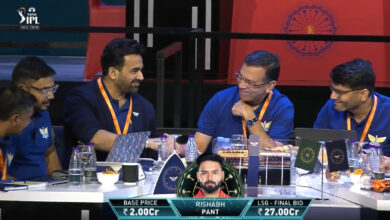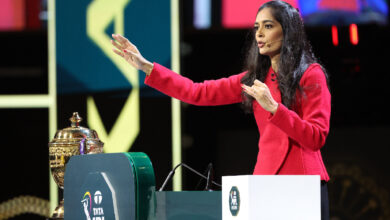Kidambi Srikanth: Home-sick boy who took up badminton for ‘timepass’ is India’s undefeated Thomas Cup hero

Sport boasts of glorious tales of overcoming adversity: economic and social hardships, physical impediments, parental opposition, geography and gender. Kidambi Srikanth has not necessarily encountered those. All he dreads is travel — a prerequisite for international sport.
Everyone close to him — his parents, brother Nandagopal, coach P Gopichand and physio Kiran Challagunda — knows that once he fetches up on court in any part of the world, he is capable of staking claim to the title. Opponents and rival coaches remain wary of him hitting a purple patch, shredding reputations of Olympic and World Championship-proportions.
Like late last year when he won the silver at the World Championship or this magical week at Bangkok, where it was his straight set win over Indonesian Jonatan Chrie in the second singles that helped India secure their first-ever Thomas Cup title. Srikanth remained unbeaten in the tournament to reserve his place in the Indian badminton’s Hall of Fame.
Back in 2017, Srikanth had spoken to The Indian Express about his problem with taking flights.
“I’m travelling so much, I have started hating it. I love being at one place,” he mutters. The cribbing had comes after he had made it to the finals of the Singapore, Indonesia and Australian Opens, winning two of those.
India’s Srikanth Kidambi returns a shot at Thomas & Uber Cup in Bangkok, Thailand. (AP Photo/Sakchai Lalit)
In a span of three months, he had travelled and triumphed across three continents. “I didn’t get time to celebrate because I had to take an immediate flight to Paris. I’ll celebrate after I go back to Hyderabad,” he says. Older brother Nandagopal chuckles as he predicts what shape that party will take — the tight-knit family of four, parents and two sons, eating out at a quiet restaurant.
Srikanth might have a 100 visa stamps on his passports, but he inss his idea of a perfect holiday is running back home. “I stay away from home so much. Every time I get time, I want to go home,” he had said before coach Gopichand asked his parents to relocate to Hyderabad from Guntur, a little startled Srikanth’s bouts of homesickness. The family took up a villa in Gachibowli, reuniting almost after a decade of the boys camping out at badminton academies across the state — Khammam, Guntur, Vijayawada and Hyderabad.
Srikanth craved Indian food wherever he travelled, and home food when he was at Hyderabad training at the Pullela Gopichand Badminton Academy. “I love to sit back home, relax with a few friends and joke about small things. I enjoy doing nothing,” he says.
For all that searing ambition he is expected to feel, Srikanth’s career had started as “timepass”. He recalls the usual fights with brother Nandu for the TV remote and the front seat, but the two were thick and Srikanth followed the older sibling into badminton. His father was a reasonably well-off land-owning farmer in Guntur (then a part of Andhra Pradesh), and though the parents insed that studies and sport ought to get equal attention, Srikanth was gravitating towards badminton. “I watched the 2001 All England final, the first-ever sport I watched. To be frank, I didn’t know anything about badminton’s hory. I only got to know it when I turned pro,” he says.
India’s Srikanth Kidambi plays a shot during the Thomas & Uber Cup in Bangkok, Thailand. (AP Photo/Sakchai Lalit)
Gopichand would visit Guntur where Srikanth was training under coach Sudhakar Reddy. He was doing well but his laidback attitude meant there was no spark that could prompt Gopichand to take him on board. Nandagopal had shown early signs of what is now a left-handed full-throttle backhand jump smash and left for Hyderabad, while the parents had to step in to ensure Srikanth could follow at the age of 15.
“Nandu was senior in everything, even in getting serious about the sport. I started going to the stadium and slowly began enjoying it. Doubles was so different from singles, I used to like it, and win so much,” he recalls. He struck up a long partnership and friendship with another player, Hema Nagendra Babu.
“Gopi Sir is a big mentor. He’s not friendly or anything, but there’s just great communication with him. In my junior years, he would shout and get angry because of how I was,” he says. Reluctant is what he was. Or living in a world of his own.
Babu remembers a sleepless Srikanth waking up in the middle of the night to narrate his plans. Of becoming a film director. “He would talk about the scenes he would direct in the movies he’d make — not who the hero or heroine would be, but what the shot would look like and where the camera would be,” he says. Deeply impressed Telugu director Sekhar Kammula, who made the hit Happy Days in 2007, Srikanth would describe entire scenes and storylines. “He used to love imagining screenplays based on what happened at the academy,” he says. Till recently, they would laugh away, casting characters from the academy in Bahubali roles and make merry.
India’s Srikanth Kidambi reacts after defeating Denmark’s Anders Antonsen during their men’s single semi-final match. (AP Photo/Sakchai Lalit)
Actually, there were three — Srikanth, Babu and Gopi Raju — living in a mini bachelor’s pad. “Room 107 was memorable. It used to be untidy, with clothes thrown all around and cleaned only when Gopi bhaiyya or his mother came for inspections. There was a camera placed right outside,” Babu recalls. It was this camera that once caught their mischief. The tell-tale sign was two empty boxes, with the Domino’s pizzas inside polished off. “We used to successfully order biryani late at night without anyone knowing because Gopi bhaiyya would sleep at 9. The camera caught the empty pizza boxes, and he was furious,” he says.
Srikanth and his buddies would be ordered to fetch up on court at 4.30 the next morning as punishment and give multi-shuttle feeding practice to juniors, followed their own training without a break for six hours. “But he liked our discipline because we never went out or drank and were generally responsible,” Babu says.
Room 107 saw other capers too. Srikanth would round up juniors from the academy for a game of cricket in the room. “He would make them bat and bowl because he used to love fielding. He was very good at it,” he says. Srikanth’s big passion back then was carrom. They would play all-nighters, and even had a hot bulb fixed over the table, which would light up just the board.
now, Srikanth, playing at the net, was trading in pushes and half-smashes, adding strength and speed to his defence and strokes. A smash from the back court began to take shape as he started focussing on singles. “I didn’t stick to one partner after Srikanth,” says Babu, who would go on to join the Railways in 2014.
India’s Srikanth Kidambi at the Thomas & Uber Cup in Bangkok, Thailand. (AP Photo/Sakchai Lalit)
It took Gopichand some time and goading — in the middle of shepherding careers of Nehwal, Sindhu and P Kashyap — to steer Srikanth towards singles. The Hyderabadi was first noticed when he beat Thailand’s Boonsak Ponsana at the latter’s home event exactly four Octobers ago. He had collapsed in the washroom from brain fever later, and his recovery and title-winning run later in China had been as much a silent relief as a brass band announcing its arrival.
He has made a habit of beating the world’s top names in their backyard, and slowly breaking the hearts of home fans — he snapped shut twice Olympic champ and five-time world champion Lin Dan in China in 2014 and recently schooled the reigning world champ Viktor Axelsen in Denmark.
The youngster seemed to remain aloof from fame though. He hadn’t warmed up to it even after claiming his second Super Series title. “I needed to win the last point of the 2015 India Open final in Delhi to really assure myself that I was winning,” he says. When he won the Denmark Open last week, he was self-conscious on his way to court, before shyly giving a high-five to the Donald Duck mascot.
If he has been mobbed ever, he hasn’t quite noticed. “No, no, I don’t ever get mobbed,” he says, incredulous. “When people came up to me at a Hyderabad mall, I realised, ‘Oh, people really watch badminton!’”
Kidambi Srikanth reacts after bagging a point. (PTI)
It could be that superstardom comes easily to Nehwal and Sindhu, both affable girls never short on confidence. But be it Kashyap or Sai Praneeth or Srikanth, the men tend to pull on goofball faces and boast an easy, matter-of-fact wit, wearing their celebrity more lightly when going about playing Indian sport’s biggest catch-up.
Globally, though, “Ki-daam-bi” is a mini-phenomenon, acknowledged as one of the finest talents in men’s singles today. Kidambi converts neutrals to diehard fans faster than his smash-and-charge-the-net routine that is the talk of the town when he slays his rivals.
There is the big smash for everyone to swoon over, the pouncing net taps for those who sit back for a second dekko and, finally, the deception at the net for the aficionados. Nehwal had the power and grit, Sindhu thrives on speed and endurance, but Srikanth came into badminton with sublime strokes — unconventional because some are borrowed from the doubles game, and unreadable for opponents. India has had winners in the last decade, but in Srikanth lies the promise of greatness, if he can rise to the big moments.
For better or for worse, he goes about this challenge unrushed, reserving all the flurry and pace only for his formidable attacks. Watching a Srikanth match is savouring every rally and not quite knowing when his layered game, with its deft deceptions and shot selection, will turn the tables on his opponent. Not so much an outwitting of opponents as out-conjuring a wizard. And because it’s so innate, Srikanth struggles at deconstructing it for muggles. “I’m not really thinking about winning, I only want to be consent and play my best.”
Kidambi Srikanth made a winning start at the tournament. (File)
He values precision. “At that particular moment, if I can send the shuttle in a particular direction, I think I’ve played well that day,” he says. Consency is a desired quality for a shuttler like him. “You don’t really get to smash always,” he wryly smiles as he mulls the transitions from defence to attack. “I put in a lot of effort into understanding my defensive training, because that is the only way I’d know when I can attack,” he says.
On days when he is in ominous form, no opponent looks unbeatable. “For me, playing in the zone means when you feel really confident. .. You feel free on court, as if everything is working for you…I’m playing sharp and every shuttle gets into the court.”
He talks about feeling free because he’s felt severely constricted at times, when badminton’s gotten overbearing. Brother Nandagopal talks of the Himalayan pressure that Srikanth brought upon himself soon after beating Lin Dan. “Social media had become big then, and he used to be very touchy about everything the press said,” he recalls. Around the badminton league in 2015, he had even snapped when quizzed the media about his head-to-head with Chong Wei. “When he stopped over-thinking and realised he can control only his badminton and nothing else, he matured. If he wins, he starts preparing for the next tournament. If he loses, he gives credit to the opponent and moves on,” Nandagopal says.
The two have shared a room for 16 years now. “I know he was upset after losing in the quarters of the Olympics (to Lin Dan). But he got over it and has won three titles this year. It took time, but he matured,” he says. The loss at Rio had been rough, his pain visceral, but he disappeared from view for a few days and returned wiser. “I’m not worried about losing, I don’t want to be super happy when I win either. I just don’t want to have any regrets after a match. I want to play every stroke that can get me a win,” Srikanth says, shrugging off his loss against Korean Son Wan Ho at the World Championships too.
Kidambi Srikanth had a lean patch in 2018. (File)
Cocooned inside the world of training-tournaments-family-coach, Srikanth’s other interest is checking out the latest creation of Odisha’s sand art Sudarshan Pattnaik. He grew up a fair bit on India’s quiet eastern coast, and he loved that his Maldives title came at a seafront. He reckons badminton is a bit like sand art — carving mounds of golden dust into something beautiful in that moment, and then letting the waves wash over it to build a new one the next day. Srikanth is building sand castles alright, but on terra firma. “I want to have that mark of being one of the best players in the world. To be known as someone who won every tournament. I want people to say here is someone who won everything and so many world championships,” he states his ultimate goal.
What about material possessions? “I don’t shop too much — only when it’s necessary.” Or cars: “I drive, but I’m not obsessed with cars — you just need one car to reach wherever you need to go; not a fleet.” What about money? “I’ll wish I always have enough … but it’s not very important.” On being non-cricket’s Virat Kohli, because of his aggression and all that: “Hahahahahaha, I don’t know. I haven’t thought of that.”
Kidambi Srikanth beat Asian Games champion Jonatan Chrie 21-17 11-21 21-12. (File)
He is known to keep to himself at most times, and open up only in the company of friends or family. He watches tennis, digs Roger Federer, and started playing tennis with his brother, as an ode. Dhoni is his gold standard for consency and temperament, and “getting the job done with minimal fuss.” His equanimity is right from the Dhoni manual of thinking.
The closest he’s found magic in life is watching physio Challagunda fix his injuries. “You need to have complete belief in someone, and fully rely on them. He’s been watching over me from day one, he explains to me what my body has gone through.”
He sports a variety of amulets, but reckons it’s best to prop up his game, and leave nothing to divinity. “I believe in God, but I’m not someone who’ll leave everything to God. 90 per cent is my hard work.”







